Passé Simple (Simple Past) Tense Conjugation of the French Verb déplorer
Introduction to the verb déplorer
The English translation of the French verb déplorer is “to deplore.” The infinitive form déplorer is pronounced as “day-plor-ay.”
Déplorer is derived from the Latin verb “deplorare,” meaning “to weep bitterly.” In everyday French, déplorer is commonly used in the passé simple tense to express a strong feeling of regret or sadness for a past event. This tense is typically used in formal or literary contexts.
Here are three examples of déplorer in the passé simple tense:
-
J’écoutai son histoire avec attention et déplorai les erreurs qu’il avait commises.
(I listened to his story attentively and deplored the mistakes he had made.) -
Elle déplora la perte de son emploi et chercha immédiatement des solutions.
(She deplored the loss of her job and immediately sought solutions.) -
Les citoyens déplorèrent les mesures prises par le gouvernement sans aucune consultation.
(The citizens deplored the measures taken by the government without any consultation.)
English translations:
- I listened to his story attentively and deplored the mistakes he had made.
- She deplored the loss of her job and immediately sought solutions.
- The citizens deplored the measures taken by the government without any consultation.
Table of the Passé Simple (Simple Past) Tense Conjugation of déplorer
| Pronoun | Conjugation | Short Example | English Translation |
|---|---|---|---|
| Je | déplorai | Je déplorai son départ. | I regretted his departure. |
| Tu | déploras | Tu déploras cette situation. | You regretted this situation. |
| Il | déplora | Il déplora sa décision. | He regretted his decision. |
| Elle | déplora | Elle déplora l’incident. | She regretted the incident. |
| On | déplora | On déplora la perte. | One regretted the loss. |
| Nous | déplorâmes | Nous déplorâmes la violence. | We regretted the violence. |
| Vous | déplorâtes | Vous déplorâtes cette erreur. | You regretted this mistake. |
| Ils | déplorèrent | Ils déplorèrent l’accident. | They regretted the accident. |
| Elles | déplorèrent | Elles déplorèrent les conséquences. | They (feminine) regretted the consequences. |
Other Conjugations for Déplorer.
Le Present (Present Tense) Conjugation of the French Verb déplorer
Imparfait (Imperfect) Tense Conjugation of the French Verb déplorer
Passé Simple (Simple Past) Tense Conjugation of the French Verb déplorer (You’re reading it right now!)
Passé Composé (Present Perfect) Tense Conjugation of the French Verb déplorer
Futur Simple (Simple Future) Tense Conjugation of the French Verb déplorer
Futur Proche (Near Future) Tense Conjugation of the French Verb déplorer
Plus-que-parfait (Pluperfect) Tense Conjugation of the French Verb déplorer
Passé Antérieur (Past Anterior) Tense Conjugation of the French Verb déplorer
Futur Antérieur (Future Anterior) Tense Conjugation of the French Verb déplorer
Subjonctif Présent (Subjunctive Present) Tense Conjugation of the French Verb déplorer
Subjonctif Passé (Subjunctive Past) Tense Conjugation of the French Verb déplorer
Subjonctif Imparfait (Subjunctive Imperfect) Tense Conjugation of the French Verb déplorer
Subjonctif Plus-que-parfait (Subjunctive Pluperfect) Tense Conjugation of the French Verb déplorer
Conditionnel Présent (Conditional Present) Tense Conjugation of the French Verb déplorer
Conditionnel Passé (Conditional Past) Tense Conjugation of the French Verb déplorer
Conditionnel Passé II (Conditional Past II) Tense Conjugation of the French Verb déplorer
L’impératif Présent (Imperative Present) Tense Conjugation of the French Verb déplorer
L’impératif Passé (Imperative Past) Tense Conjugation of the French Verb déplorer
L’infinitif Présent (Infinitive Present) Tense Conjugation of the French Verb déplorer
L’infinitif Passé (Infinitive Past) Tense Conjugation of the French Verb déplorer
Le Participe Présent (Present Participle) Tense Conjugation of the French Verb déplorer
Le Participe Passé (Past Participle) Tense Conjugation of the French Verb déplorer
Struggling with French verbs or the language in general? Why not use our free French Grammar Checker – no registration required!
Get a FREE Download Study Sheet of this Conjugation 🔥
Simply right click the image below, click “save image” and get your free reference for the déplorer Passé Simple tense conjugation!

Déplorer – About the French Passé Simple (Simple Past) Tense
Formation
Usage
Narration
Historical Context
Interactions with other tenses
Passé Composé
Imparfait
Conditional and Subjunctive
Summary
I hope you enjoyed this article on the verb déplorer. Still in a learning mood? Check out another TOTALLY random French verb conjugation!


